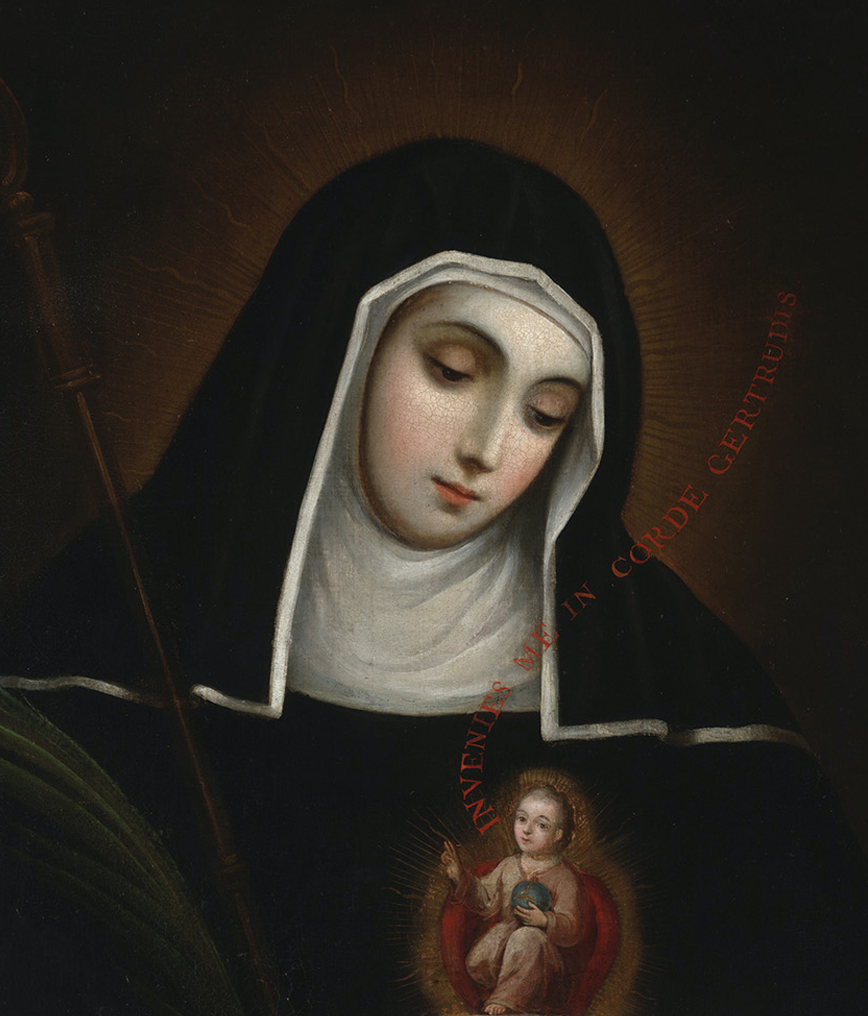
Beloved Spouse of Jesus, Patron of the Dead, Mystic, Theologian
St. Gertrude the Great
St. Gertrude the Great was born on the Feast of the Epiphany, January 6, 1256 in Eisleben, Germany. At the age of five, she began to attend a Cistercian monastery school in Saxony called Helfta, which is why she is also known as St. Gertrude of Helfta. She was described as a lovable, quick-witted child by the nuns of Helfta. During her academic studies, St. Gertrude stood out for her intelligence and became accomplished in philosophy, literature, singing, and miniature painting.
St. Gertrude entered the Benedictine order at Helfta and continued to devote herself to her studies. In her writings, St. Gertrude recalls that she neglected her spiritual calling for the first several years in the monastery because she was so engrossed in intellectual pursuits. However, around the age of twenty-four, she began to find the daily routines of her community monotonous and experienced a lack of meaning in her accomplishments, as well as feelings of anxiety and depression.
In the year 1281, St. Gertrude had her first vision of Jesus, in which he called her to conversion and told her, “I have come to comfort you and bring you salvation.” By God’s grace, she dramatically reoriented her priorities and immersed herself in Scripture, the writings of the Church Fathers, and theology. Pope Benedict XIV bestowed St. Gertrude with the title of “the Great” as a result of her spiritual and theological insights.
St. Gertrude continued to have mystical experiences, in which Jesus instructed her to share all that He revealed to her with the rest of the world. Some of her writings are still available today, including her Spiritual Exercises and a brief autobiography, The Herald of Divine Love. St. Gertrude’s writings and attractive demeanor bore much fruit, resulting in the conversion of many who encountered her and her works.
St. Gertrude’s special devotion to the holy souls in purgatory has made her a patron of the dead. Catholic tradition says that Jesus promised St. Gertrude that 1,000 souls would be released from purgatory every time the following prayer is recited with devotion:
Eternal Father, I offer Thee the Most Precious Blood of Thy Divine Son, Jesus, in union with the masses said throughout the world today, for all the holy souls in purgatory, for sinners everywhere, for sinners in the universal church, those in my own home and within my family. Amen.
St. Gertrude’s health began to decline when she was in her forties, prompting her to reflect on the joy Jesus had brought to her life. She wrote, “Until the age of 25, I was a blind and insane woman… but you, Jesus, deigned to grant me the priceless familiarity of your friendship by opening to me in every way that most noble casket of your divinity, which is your divine Heart, and offering me in great abundance all your treasures contained in it.” At the turn of the 14th century, St. Gertrude passed away to be with her eternal Bridegroom.
Feast Day: November 16

